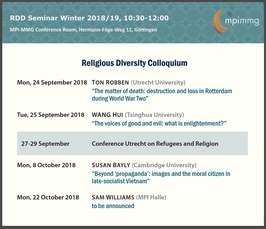"Politics in the piyasa: marching, marketing, and the emergence of gay identities in Istanbul"
Religious Diversity Colloquium Winter 2018/19
- Date: Oct 22, 2018
- Time: 10:30 AM - 12:00 PM (Local Time Germany)
- Speaker: Sam Williams (Max Planck – Cambridge Centre for Ethics, Economy, and Social Change ▪ Max Planck Institute for Social Anthropology)
- Samuel Williams is a Research Fellow in the Max Planck-Cambridge Centre for Ethics, Economy, and Social Change, and he is based at the Max Planck Institute for Social Anthropology in Halle. His research examines interesections between economy and material culture in Turkey, and he has a particular interest in the ethnographic study of markets and marketplaces. He has conducted fieldwork over the last decade on contemporary commerce in two historic Istanbul marketplaces ––the Grand Bazaar and Istiklal Street–– and his current multi-sited field research explores the traffic in gold between Europe and the Middle East. Trained in social anthropology at the University of Sydney and Princeton University, he has held prior appointments as a Postdoctoral Fellow at Musée du Quai Branly–Jacques Chirac and as Andrew W Mellon Visiting Lecturer at the Courtauld Institute of Art.
- Location: MPI-MMG, Hermann-Föge-Weg 12, Göttingen
- Room: Conference Room

For more details please contact vdvoffice(at)mmg.mpg.de.
The emergence of gay identities in Istanbul is often regarded as a practical result of mobilisation by minority sexual rights NGOs. Indeed, Istanbul Pride parade emerged during the early 2000s as a widely-referenced exemplar of the political promise of street-level activism in Turkey. Tracing how the term gay initially came to be used in the nightlife market around İstiklâl Street and reconstructing the early history of agitation for an annual Pride march, this paper argues that it is not street-level campaigners but rather street traders and small-scale entrepreneurs who have played the critical role in prising open spaces in the city where men could come to identify themselves and be identified by others as gay. Moreover, spaces afforded by particular fixed-place businesses in the nightlife market critically shaped the initial forms of political association involving gay men that were able to develop and consolidate in the city.